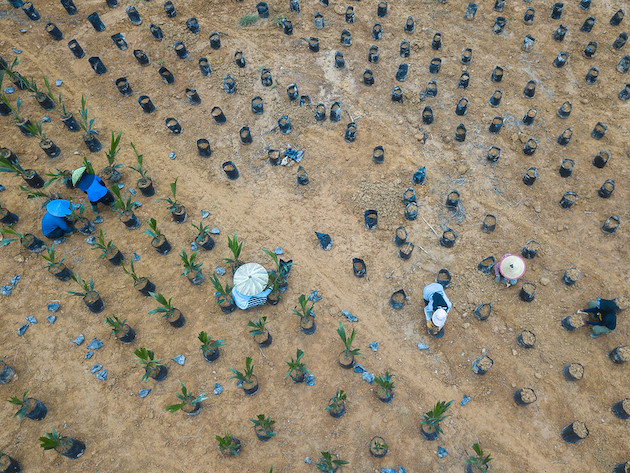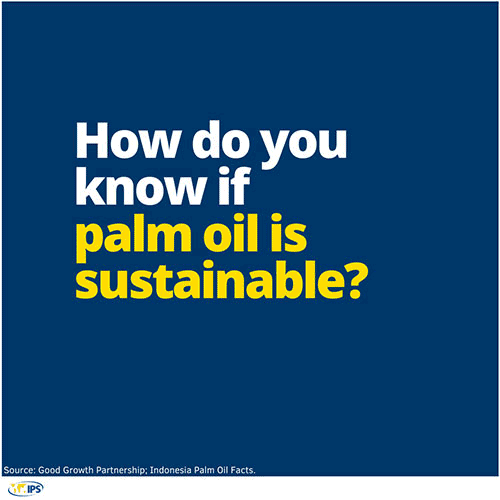[ad_1]

JOHANNESBURG, Apr 27 (IPS) – Smallholder farmers are crucial to the success of Indonesia’s efforts to handle deforestation and local weather change. Creating an understanding and supporting this group, internally and overseas, is an important goal for these working in the direction of lowering deforestation and selling good farming practices, particularly as smallholders usually work hand-to-mouth and are weak to perpetuating unsustainable farming practices.
Musim Mas, a big palm oil company concerned in sustainable manufacturing, says smallholders “maintain roughly 40 % of Indonesia’s oil palm plantations and are a big group within the palm oil provide chain. This represents 4.2 million hectares in Indonesia, roughly the dimensions of Denmark. Based on the Palm Oil Agribusiness Strategic Coverage Initiative (PASPI), smallholders are set to handle 60 % of Indonesia’s oil palm plantations by 2030.”
Since final yr a brand new World Financial institution-led programme, the Food Systems, Land Use and Restoration (FOLUR), incorporates the United Nations Improvement Programme Good Growth Partnership (GGP). It should proceed to be concerned within the success of palm oil manufacturing and smallholders’ assist—essential, particularly as a study showed that the “sector lifted round 2.6 million rural Indonesians from poverty this century,” with knock-on improvement successes together with improved rural infrastructure.
Over the previous 5 years, GGP carried out centered coaching with about 3,000 smallholder farmers, says UNDP’s GGP International Undertaking Supervisor, Pascale Bonzom:
“The thought was to pilot some public-private partnerships for coaching, new methods of getting the producers to undertake these agricultural practices in order that we might be taught from these pilots and scale them up by way of farmer assist system methods,” Bonzom says.
Farmer organizations chatting with IPS defined how they, too, assist smallholder farmers.
Amanah, an unbiased smallholder affiliation of about 500 unbiased smallholders in Ukui, Riau province, was the primary group to obtain Indonesian Sustainable Palm Oil (ISPO) certification as a part of a joint programme, proper earlier than the beginning of GGP, between the Indonesian Ministry of Agriculture, UNDP, and Asian Agri. This adopted coaching in good agricultural practices, land mapping, excessive carbon inventory (HCS), and excessive conservation worth (HCV) methodologies to establish forest areas for defense.
“The vast majority of unbiased smallholders in Indonesia don’t have the capability to implement greatest practices within the palm oil area. Consequently, you will need to present help and coaching on good agricultural practices within the area on an everyday and ongoing foundation,” Amanah commented, including that the coaching included making ready land for planting sustainably and utilizing licensed seeds, fertilizer, and good harvesting practices.
A producer group, SPKS, mentioned it was working with farmers to implement sustainable practices. It established a smallholders’ database and assisted them with ISPO and Roundtable on Sustainable Palm Oil (RSPO) certifications.
Collectively with High Conservation Value Resource Network (HCVRN), it created a toolkit for unbiased smallholders on zero deforestation. This has already been carried out in 4 villages in two districts.
“At this stage, SPKS and HCVRN are designing advantages and incentives for unbiased smallholders who already shield their forest space (alongside) with the indigenous individuals,” SPKS mentioned, including that it anticipated that these initiatives may very well be used and adopted by these going through EU laws.
SPKS sees the brand new EU deforestation laws as a priority and a possibility, particularly because the union has proven a dedication to supporting unbiased small farmers—together with monetary assist to arrange for readiness to adjust to the laws, together with geolocation, capability constructing, and truthful value mechanisms.
Amanah additionally pointed to the EU laws, which incentivize unbiased smallholders to stick to the certification course of.
“As required by EU legislation, the EU can also be tasked with implementing packages and help on the upstream degree in addition to serving as an incentive for unbiased smallholders who already adhere to the certification course of. The unbiased smallholder can be inspired by this incentive to make use of sustainable greatest practices. Financing could also be used as an incentive. The unbiased smallholders can be inspired by this incentive to make use of sustainable greatest practices,” the group instructed IPS.

SPKS want to see closing EU laws embody a requirement for corporations importing palm oil into the EU to ensure a direct provide chain from at the least 30 % of unbiased smallholders primarily based on a good partnership.
“Within the draft EU laws, it’s not but clear whether or not the due diligence relies on deforestation-related risk-based evaluation. Indonesia is usually thought-about a rustic with a excessive deforestation price, and palm oil is perceived to be a think about deforestation. Contemplating this, we hope the EU will take into account smallholder farmers by guaranteeing that EU laws don’t additional burden them by issuing Technical Tips particularly designed for smallholder farmers.”
In April 2023, the European Parliament passed the law introducing rigorous, wide-ranging necessities on commodities similar to palm oil. The UNDP is now researching the way it ought to step up its help to producers to fulfill the standards.
Setara Jambi, a company devoted to schooling and capability constructing for oil palm smallholders for sustainable agricultural administration, says that whereas they’re involved concerning the EU laws, small farmers have “many limitations, that are totally different from corporations that have already got sufficient establishments.
“This concern won’t come up if there’s a sturdy dedication from each authorities and firms (consumers of smallholder contemporary fruit bunches) to help smallholders in making ready and implementing sustainable palm oil administration.”
The following 5 years with FOLUR will face important challenges. There’s a want to make sure that the Nationwide Motion Plan strikes to the subsequent degree as a result of it’ll expire on the finish of 2024. It should require updating and increasing.
In Indonesia, there are 26 provinces and 225 districts that produce palm oil. And on the time of writing, eight provinces and 9 districts have developed their very own variations of the pilot Sustainable Palm Oil Motion Plan and developed their very own provincial or district-level Sustainable Palm Oil Motion Plans.
There’s a lot to do, together with supporting the Indonesian authorities’s multi-stakeholder course of, capability constructing for the non-public sector, supporting an enabling atmosphere for all, and dealing with monetary establishments to make funding selections aligned with deforestation commitments.
The most important situation is to get the smallholder farmers on board. As a result of they stay a lifetime of survival, usually they’re weak to “short-termism.”
On the constructive facet, the FOLUR initiative has the federal government’s backing. On the launch in Jakarta final yr, Musdhalifah Machmud, Deputy Minister for Meals and Agriculture on the Coordinating Ministry for Financial Affairs, mentioned that the implementation of the FOLUR Undertaking was anticipated to have the ability to create a worth chain sustainability mannequin for rice, oil palm, espresso, and cocoa by way of sustainable land use and “comprehensively by taking note of biodiversity conservation, local weather change, restoration, and land degradation.”
At that launch workshop in Jakarta, the World Financial institution’s Christopher Brett, FOLUR co-leader, famous: “Wholesome and sustainable worth chains provide social advantages and generate earnings with out placing undue stress on the atmosphere.”
Bonzom agrees: “On the finish of the day, they (smallholders) might want to see the advantages—higher market phrases, higher costs, higher, safer contracts—that’s what’s engaging for them.”
IPS UN Bureau Report
Follow @IPSNewsUNBureau
Follow IPS News UN Bureau on Instagram
© Inter Press Service (2023) — All Rights ReservedOriginal source: Inter Press Service
[ad_2]

